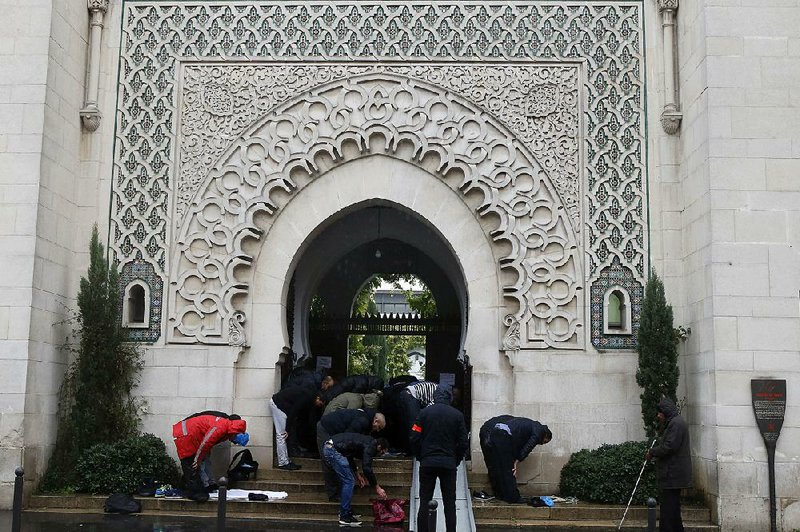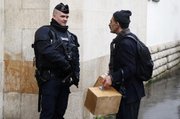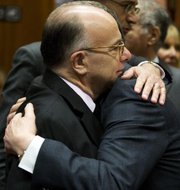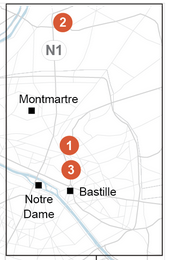BRUSSELS -- European Union nations promised Friday to quickly tighten the bloc's external border in a bid to prevent more violent extremists from entering.
RELATED ARTICLES
http://www.arkansas…">Obama will visit Malaysian center, spotlight refugeeshttp://www.arkansas…">Justices asked to back Obama on aliens
One week after coordinated gun and bomb assaults in Paris that killed 130 people, France prodded the rest of Europe to seal the region's porous borders to prevent homegrown jihadists from traveling undetected between the continent and the battlefields of the Middle East.
French Interior Minister Bernard Cazeneuve urged his counterparts to agree to new security measures, including more involved passport checks at Europe's borders, warning his counterparts Friday that "we can't lose any more time."
Law enforcement officials have warned of the risk of more attacks, as the French step up military action against the Islamic State in its Syrian base with support from allies, including the U.S. and Russia.
European Union governments agreed to tighten passport checks at the bloc's outer border, and France said controls at its entry points will remain in place as long as it faces a heightened threat.
European ministers ordered "systematic and coordinated checks" of passports at the external borders starting immediately, and including all travelers in the full-blown screening that beforehand had been limited to non-EU passport holders.
They set a March target date for the governments to have a system in place that gives border officials the capability of checking the names of people entering the continent's free-travel area against European police databases.
The 28-nation bloc also pledged Friday to step up intelligence sharing.
Cazeneuve said "terrorists are crossing the borders of the European Union," underlining the urgent need for the bloc to implement a system for collecting and exchanging airline passenger information. He said that is vital "for tracing the return of foreign fighters" from Syria and Iraq.
The EU exchanges such information with the U.S., Australia and Canada but has been unable to agree on a system for sharing data among EU members.
"We must move swiftly and with force," Cazeneuve said. "Europe owes it to all victims of terrorism and those who are close to them."
Ministers also agreed to step up cooperation against arms trafficking and said they would share data on suspected foreign fighters. They called for fingerprinting of all illegal migrants arriving in Europe and demanded that EU passenger name-recognition legislation, blocked in the European Parliament since 2011 because of data privacy concerns, be adopted by the end of this year. Passenger name records have been required for all flights in the U.S. since 2001.
A European Parliament committee chairman said he believes that the EU can finally seal a deal by the end of next month on sharing air passenger information.
"It is entirely possible for a strong proposal to be completed before the end of 2015," said Claude Moraes, the chairman of the assembly's civil liberties committee.
A third body
In France, authorities reported that a third body had been found in an apartment that police raided in the search for the suspected mastermind of last week's attacks in Paris.
The Paris prosecutor's office said the three bodies found in Saint-Denis after Wednesday's raid were those of Abelhamid Abaaoud, a Belgian national in his late 20s and believed to have been an orchestrator of the Paris attacks; his cousin Hasna Aitboulahcen, 26; and a third man who was not identified.
Also Friday, investigators said they had determined through fingerprint checks that two of the seven attackers who died in the attacks last week had entered Europe through Greece on Oct. 3.
Previously they had said only one attacker had been registered in Greece, a main entry point for migrants seeking asylum in Europe. That man carried a passport identifying him as Ahmad Al-Mohammad, but it's unclear whether the passport was authentic.
Belgian authorities Friday released seven people detained a day earlier, but continued to hold one person suspected of links to the Paris attacks and one person linked to one of the suicide bombers but not directly involved in the Paris attacks.
In France's Senate, legislators voted to extend for three months a state of emergency, which expands police powers to carry out arrests and searches, and allows authorities to forbid the movement of people and vehicles at specific times and places.
The three-month extension also grants the French government authority to ban large gatherings in public places and to put suspected extremists under house arrest.
Of the more than 350 people wounded in the Paris attacks, scores remain in critical condition. Prime Minister Manuel Valls on Friday said one hospitalized person had died, raising the Paris death toll to 130. That tally that does not include any of the attackers.
French remember
Under gray skies and rain Friday, Parisians marked the one-week anniversary since the bloodbath. Most demonstrations have been banned in the city since the attacks, but Parisians have been spontaneously gathering all week outside the restaurants, cafes and concert hall hit in the attacks, leaving flowers, lighting candles or holding quiet vigils.
"I'm still reeling because these are the neighborhoods where we young people go out a lot, places we know well," student Sophie Garcon said as she looked at tributes left outside the Le Carillon bar, one of the nightspots attacked last week.
Dozens of French artists, writers and musicians urged people to light candles and play music at exactly 9:20 p.m., the time the attacks began, in a show of defiance against the extremists.
French President Francois Hollande's office said he will lead a national ceremony next Friday honoring the victims of the attacks, the deadliest in France in decades. The ceremony will be at the gold-domed Hotel des Invalides, which houses the tomb of Napoleon.
Hollande plans to travel to Washington and Moscow next week to push for a stronger international coalition against the Islamic State.
In calling on all nations to redouble their efforts and coordinate action to prevent more attacks by extremist groups, the U.N. Security Council unanimously approved a French-sponsored resolution Friday.
The resolution says the Islamic State "constitutes a global and unprecedented threat to international peace and security," and it expresses the council's determination "to combat by all means this unprecedented threat."
The resolution "unequivocally condemns in the strongest terms" the "horrifying terrorist attacks" carried out this year by the Islamic State in Paris, Beirut, Sousse in Tunisia, and Ankara in Turkey.
Also, the resolution calls on U.N. member states "that have the capacity to do so to take all necessary measures" against the Islamic State and all other violent extremist groups "to eradicate the safe haven they have established over significant parts of Iraq and Syria."
The resolution does not constitute an authorization for military action, however, because the resolution is not drafted under Chapter 7 of the U.N. Charter, which is the only way the United Nations can give a green light to the use of force.
The resolution urges U.N. member states "to intensify their efforts to stem the flow of foreign terrorist fighters in Iraq and Syria and to prevent and suppress the financing on terrorism."
The new resolution draws on language that's in the resolution the council adopted a day after the Sept. 11, 2001, terrorist attacks in the United States. It called on all countries "to redouble their efforts to prevent and suppress terrorist acts including by increased cooperation."
Also, the resolution reaffirms that those involved in terrorist acts must be held accountable and expresses the council's determination to swiftly update the list of people and organizations subject to U.N. sanctions "to better reflect the threat" posed by the Islamic State.
Information to this article was contributed by Lorne Cook, Sylvie Corbet, Thomas Adamson, Samuel Petrequin, Angela Charlton, Lori Hinnant, Jamey Keaten, John-Thor Dahlburg, Bassem Mroue and Edit M. Lederer of The Associated Press; by John Follain, Ian Wishart, Gregory Viscusi, Phil Serafino, David Whitehouse, Pauline Bax, Francois Rihouay, Patrick Donahue and John Martens of Bloomberg News; and by Anthony Faiola William Booth, Emily Badger, Souad Mekhennet, Annabell Van den Berghe, Brian Murphy, David Nakamura, Daniela Deane, Virgile Demoustier and Karla Adam of The Washington Post.
A Section on 11/21/2015




